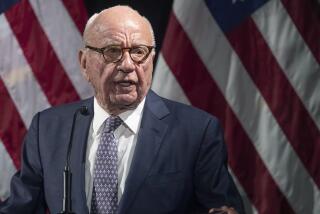Executive in Fraud Case Wins Acquittal
- Share via
Dealing a setback to the government’s crackdown on corporate fraud, a Los Angeles federal jury Wednesday acquitted a former computer firm executive of charges that he filed inflated financial reports and lied under oath to regulators.
Steven C. Veen, who was NewCom Inc.’s chief financial officer, was one of three executives at the defunct Westlake Village company who were indicted in September 2002 in what prosecutors portrayed as a kickoff to President Bush’s crusade against white-collar criminals.
On that day, FBI agents escorted a handcuffed Veen past TV cameras in a “perp walk.”
This week, after two days of deliberations, jurors found him not guilty.
“Not even this resounding verdict can erase the pain and humiliation that the government’s actions caused Steve and his family,” defense attorney Marc S. Harris said. “But it’s a start.”
The verdict is the second recent reminder that despite the public outcry over the Enron Corp. accounting fraud and numerous other corporate scandals, it can be difficult to prove beyond a reasonable doubt that executives had the knowledge and criminal intent necessary to send them to prison.
In October, former Silicon Valley investment banking star Frank Quattrone’s trial on obstruction-of-justice and witness-tampering charges ended with a Manhattan federal jury deadlocked 8 to 3 for conviction. Prosecutors plan to retry Quattrone.
In the NewCom case, the firm’s former chief executive, Sultan Khan, and former executive vice president, Asif Khan, pleaded guilty in October to fraud and conspiracy. (The Khans are not related.)
Veen, who was NewCom’s acting CFO when the false quarterly financial reports were filed in 1998, maintained that he had been unaware that the firm was booking tens of millions of dollars in fake sales to pump up its stock price.
When the revenue was later reversed on NewCom’s books, the market value of the firm’s shares plummeted by $140 million. NewCom folded in 1999.
Juror Barbara Kilgore of Whittier said the case boiled down to the believability of an interim NewCom CFO, Edward Stoltenberg, who claimed he tipped off Veen to NewCom’s problems before Veen signed the reports to the Securities and Exchange Commission.
Kilgore said jurors wondered why Stoltenberg hadn’t blown the whistle himself to the SEC if he knew about fraud. She also noted that Stoltenberg testified that a third person participated in the meeting at which he supposedly tipped off Veen, but the third party couldn’t recall the meeting taking place.
The government “definitely proved there was fraud,” Kilgore said. “We just didn’t feel they proved that Veen knowingly filed anything false.”
During a five-week trial, defense attorney Harris repeatedly challenged the credibility of prosecution witnesses. He called just one defense witness before agreeing to submit the case to the jury, arguing that other government evidence undercut Stoltenberg’s testimony.
NewCom was a 1997 spinoff from El Segundo-based Aura Systems, a company with a long history of run-ins with securities regulators. Aura’s longtime chief executive, Harry Kurtzman, quit in 2002 as the SEC was preparing accounting fraud charges against him, Veen and the Khans.
Veen, a certified public accountant, had been Aura’s CFO under Kurtzman as well as CFO at NewCom. In June 2002, Veen settled an SEC civil suit charging him with knowingly or recklessly overstating revenue at both companies.
Veen, who didn’t admit or deny guilt, was fined $50,000 and was banned for five years from acting as an officer or director of a public company.
In the criminal case this week, jurors acquitted Veen of two counts of knowingly signing false quarterly reports and one count of lying during testimony to the SEC in 1999 about the fake sales and other accounting problems.
Outside of the courtroom Wednesday, Harris characterized his client as vindicated by the “swiftness and totality of the verdict,” which he said sends this message to federal officials: “They had better be careful about casting the net too widely in those cases.”
Assistant U.S. Attys. Pamela L. Johnston and Michael R. Wilner, who prosecuted the case, said they would try it again if they had a chance despite the fact that, as Johnston put it, “the jury took a different view of the evidence than we did and felt we did not meet the heavy burden of proof in criminal cases.”
“We don’t shy away from the difficult cases,” Wilner said. “Especially in this era when investors can lose their life savings by investing in the companies where fraud occurs.”







